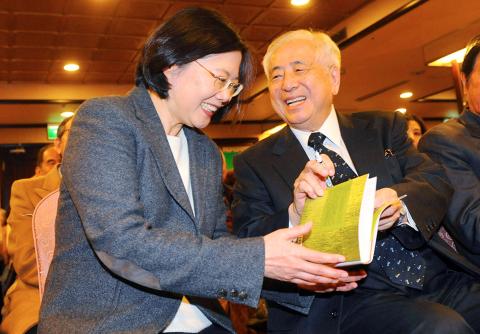The man likely to become the new prime minister of Japan, Shinzo Abe, could turn out to be Taiwan’s biggest enemy if Taipei chooses to maintain the pro-China stance it has adopted under President Ma Ying-jeou’s (馬英九) administration, former representative to Japan Koh Se-kai (許世楷) said yesterday.
Known for his friendliness toward Taiwan, Abe has also been aware of Taipei’s gradual tilting toward Beijing, which poses a strategic threat to Japan, Koh said at the launch of his new book yesterday.
“Abe is one of Taiwan’s most trustworthy Japanese allies. However, I’d say the length of that friendship will be determined by which path Taiwan chooses to walk on: the pro-China path or the pro-US-Japan one,” said Koh, who served as Taiwan’s top diplomat to Japan between 2004 and 2008.

Photo: CNA
The solid relationship between Japan and Taiwan that Koh established during his diplomatic career has started to crack under Ma’s pro-China administration, as evidenced by Japan’s initiative to expand its air defense identification zone (ADIZ) on Yonaguni Island, Japan’s westernmost island about 110km from Hualien County.
Koh said that Japan has proposed expanding its ADIZ to include the western half of the island, which has been under the jurisdiction of Taiwan’s ADIZ, twice in June 2010 and this year, a move which suggested that Tokyo is concerns about Taipei’s strategic stance.
The Taiwan Relations Act, which the US Congress passed in 1979, and the US-Japan Treaty of Mutual Cooperation and Security are two of the most important legal documents for Taiwan in terms of security, he said, adding that the Ma administration should be cautious in choosing which partnership would best serve the nation’s interests.
Commenting on the challenges Abe would face if he becomes prime minister, Koh said that Abe will have to reinvigorate Japan’s slow economy, resolve the escalating dispute over the country’s use of nuclear power as well as make a decision on whether to raise the consumption tax, a policy championed by the previous administration.
However, the potential policy which is being watched most attentively by international and domestic observers is Abe’s wish to amend the Japanese constitution, in particular Article 9, which is a pacifist clause that renounces war and the use of force, Koh said.

Taipei has once again made it to the top 100 in Oxford Economics’ Global Cities Index 2025 report, moving up five places from last year to 60. The annual index, which was published last month, evaluated 1,000 of the most populated metropolises based on five indices — economics, human capital, quality of life, environment and governance. New York maintained its top spot this year, placing first in the economics index thanks to the strength of its vibrant financial industry and economic stability. Taipei ranked 263rd in economics, 44th in human capital, 15th in quality of life, 284th for environment and 75th in governance,

Greenpeace yesterday said that it is to appeal a decision last month by the Taipei High Administrative Court to dismiss its 2021 lawsuit against the Ministry of Economic Affairs over “loose” regulations governing major corporate electricity consumers. The climate-related lawsuit — the first of its kind in Taiwan — sought to require the government to enforce higher green energy thresholds on major corporations to reduce emissions in light of climate change and an uptick in extreme weather. The suit, filed by Greenpeace East Asia, the Environmental Jurists Association and four individual plaintiffs, was dismissed on May 8 following four years of litigation. The

A former officer in China’s People’s Liberation Army (PLA) who witnessed the aftermath of the 1989 Tiananmen Square massacre has warned that Taiwan could face a similar fate if China attempts to unify the country by force. Li Xiaoming (李曉明), who was deployed to Beijing as a junior officer during the crackdown, said Taiwanese people should study the massacre carefully, because it offers a glimpse of what Beijing is willing to do to suppress dissent. “What happened in Tiananmen Square could happen in Taiwan too,” Li told CNA in a May 22 interview, ahead of the massacre’s 36th anniversary. “If Taiwanese students or

The New Taipei City Government would assist relatives of those killed or injured in last month’s car-ramming incident in Sansia District (三峽) to secure compensation, Mayor Hou You-yi (侯友宜) said yesterday, two days after the driver died in a hospital. “The city government will do its best to help the relatives of the car crash incident seek compensation,” Hou said. The mayor also said that the city’s Legal Affairs, Education and Social Welfare departments have established a joint mechanism to “provide coordinated assistance” to victims and their families. Three people were killed and 12 injured when a car plowed into schoolchildren and their